From Politics to Mathematics
This week the Israeli government finally announced that it had decided on a plan which recognizes the principle of redeployment from part of the Palestinian territories. Of course, the details of their suggested plan have yet to be "negotiated" between all the different Israeli ministers, and the timeframe is apparently not even to start for five months. In that five months, a number of things are supposed to happen, including the start of final status negotiations, Palestinian compliance with Israeli security needs, and the annulling of the PLO Charter, among other things.
While the Israeli cabinet's decision is interesting by itself, what is even more intruiging is to see the reactions coming from the different players in the peace process game, and from other interested international parties. Some people have been reacting favorably to the fact that this current I sraeli government has at least agreed to the idea of redeployment, forgetting that historically the Likud party has been an advocate of limited redeployment and Palestinian autonomy. No, what is striking about the plan is that it has been put forward as if agreements have not already been signed b etween Israel and the Palestinians -- both Oslo II and the Hebron Protocol -- which not only recognize the principle of redeployment but specify the timetable and the extent. The Hebron Protocol, in fact, was signed by the Israeli government.
As for the conditions attached to implementation of this new plan, it should be noted that when the Palestinian National Council amended its charter according to the Oslo agreement, then Israeli foreign minister Shimon Peres made an official statement to the effect that, with this act, the Palestinians had fulfilled this part of the agreement to the satisfaction of the Israeli government. And the irony about the security conditions specified by the Israelis is that while Israel is only one part to the agreement, they are setting themselves up as the judge of whether the Palestinian Authority, the "party of the second part", has fulfilled the agreement's security requirements or not.
It should be remembered too that in terms of the size of the redeployment, under the Oslo II agreement, redeployment is supposed to be carried out in three phases, ultimately including all the Palestinian territories. The only exceptions are those areas relegated to final status talks, specifically Jerusalem, settlements and military locations -- which, in any rational calculation cannot be more than 10 percent of the Palestinian territories, leaving 90 percent to be evacuated in the three phases.
However, it is the reactions of the different players in the peace process to this Israeli proposal which are the most interesting feature of all. In principle, the Palestinian Authority has refused to dicuss the Israeli decision, saying that there is no need for new proposals or decisions -- there is an agreement and what is needed now is to find ways to implement it. In any case, Palestinians have not yet received the final draft. Meanwhile the United States is busily discussing the size of the redeployment covered in this new plan, insisting that the percentage of the territory evacuated should be a two-digit figure rather than one digit, which is what Israel seems to be heading toward.
The United States made the Hebron agreement possible, as a result of the efforts of Dennis Ross and the pressure exerted by the United States on both Israel and the Palestinians. The Palestinians received an official letter from then-secretary of state Warren Christopher in which the United States committed itself as guarantor for the implementation of the Protocol, which specified that the three-phased redeployment from West Bank rural areas would be completed by mid-1998.
This recent Israeli decision not only contradicts previously-signed agreements, but is simply not serious. It appears, in fact, to be aimed more at solving Israeli internal political problems than Israeli-Palestinian problems. Sixteen out of eighteen cabinet members voted for this proposal, so it seems they finally have something they can agree on. Another objective is to repair the deteriorating relations between Israel and the US, and to a greater extent, Europe. If it is true that the Americans are taking this proposal seriously, discussing the size of the redeployment, negotiating the number of digits, then Israel has achieved its second objective. And a third objective, to buy time for Netanyahu and to put the ball in the Palestinians' court, might also be achieved, depending on the reactions of the international actors in this drama.
However, while Israel may succeed in achieving these three objectives, it will not manage to escape its responsibilities, or to appear as the positive party in this peace process. This will gradually become clearer when the results of the lack of progress in this peace process begin to materialize, whether in rising tension between Israelis and Palestinians or in declining confidence in the peace process on the part of both the Palestinian and Israeli public.






